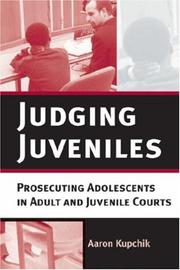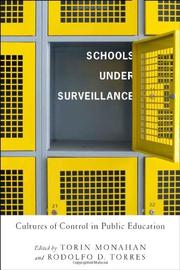| Listing 1 - 10 of 11 | << page >> |
Sort by
|
Book
ISBN: 9780814748206 0814748201 9780814748459 0814748457 0814749208 Year: 2010 Publisher: New York, NY : New York University Press,
Abstract | Keywords | Export | Availability | Bookmark
 Loading...
Loading...Choose an application
- Reference Manager
- EndNote
- RefWorks (Direct export to RefWorks)
Police officers, armed security guards, surveillance cameras, and metal detectors are common features of the disturbing new landscape at many of today’s high schools. You will also find new and harsher disciplinary practices: zero-tolerance policies, random searches with drug-sniffing dogs, and mandatory suspensions, expulsions, and arrests, despite the fact that school crime and violence have been decreasing nationally for the past two decades. While most educators, students, and parents accept these harsh policing and punishment strategies based on the assumption that they keep children safe, Aaron Kupchik argues that we need to think more carefully about how we protect and punish students.In Homeroom Security, Kupchik shows that these policies lead schools to prioritize the rules instead of students, so that students’ real problems—often the very reasons for their misbehavior—get ignored. Based on years of impressive field research, Kupchik demonstrates that the policies we have zealously adopted in schools across the country are the opposite of the strategies that are known to successfully reduce student misbehavior and violence. As a result, contemporary school discipline is often unhelpful, and can be hurtful to students in ways likely to make schools more violent places. Furthermore, those students who are most at-risk of problems in schools and dropping out are the ones who are most affected by these counterproductive policies. Our schools and our students can and should be safe, and Homeroom Security offers real strategies for making them so.
School discipline --- Classroom management --- School violence --- Education and crime --- Schools --- Problem youth --- Discipline scolaire --- Classes (Education) --- Violence dans les écoles --- Éducation et criminalité --- Jeunes difficiles --- Prevention --- Safety measures --- Education --- Conduite --- Prévention --- Classroom management. --- School discipline. --- Student discipline --- Students --- Discipline --- School management and organization --- Teaching --- Safety measures. --- At-risk youth
Book
ISBN: 0520959841 9780520959842 9780520284197 Year: 2016 Publisher: Berkeley, CA : University of California Press,
Abstract | Keywords | Export | Availability | Bookmark
 Loading...
Loading...Choose an application
- Reference Manager
- EndNote
- RefWorks (Direct export to RefWorks)
Schools across the U.S. look very different today than they did a generation ago. Police officers, drug-sniffing dogs, surveillance cameras, and high suspension rates have become commonplace. The Real School Safety Problem uncovers the unintended but far-reaching effects of harsh school discipline climates. Evidence shows that current school security practices may do more harm than good by broadly affecting the entire family, encouraging less civic participation in adulthood, and garnering future financial costs in the form of high rates of arrests, incarceration, and unemployment. This text presents a blueprint for reform that emphasizes problem-solving and accountability while encouraging the need to implement smarter school policies.
Discipline of children --- School violence --- Schools --- Child discipline --- Children --- Punishment of children --- Child rearing --- Discipline --- Punishment --- Public institutions --- Education --- Psychological aspects. --- Prevention. --- Security measures --- american politics. --- american school system. --- american schools. --- crime and punishment. --- drug searches. --- drug sniffing dogs. --- financial costs. --- harsh discipline. --- harsh school climates. --- high rates of arrest. --- high suspension rates. --- incarceration. --- mass incarceration. --- need for reform. --- police officers. --- political. --- public school system. --- reform. --- school policies. --- school reform. --- school setting. --- school to prison pipeline. --- schools. --- security practices. --- surveillance cameras. --- surveillance. --- teachers and faculty. --- teen. --- unemployment.

ISBN: 9780814747742 Year: 2006 Publisher: New York (N.Y.) New York University Press
Abstract | Keywords | Export | Availability | Bookmark
 Loading...
Loading...Choose an application
- Reference Manager
- EndNote
- RefWorks (Direct export to RefWorks)
Book
ISBN: 9780814748725 Year: 2006 Publisher: New York, NY
Abstract | Keywords | Export | Availability | Bookmark
 Loading...
Loading...Choose an application
- Reference Manager
- EndNote
- RefWorks (Direct export to RefWorks)
Book
ISBN: 9780814749203 Year: 2010 Publisher: New York, NY
Abstract | Keywords | Export | Availability | Bookmark
 Loading...
Loading...Choose an application
- Reference Manager
- EndNote
- RefWorks (Direct export to RefWorks)

ISBN: 0754626164 9780754626169 Year: 2006 Publisher: Aldershot, England ; Burlington, VT : Ashgate,
Abstract | Keywords | Export | Availability | Bookmark
 Loading...
Loading...Choose an application
- Reference Manager
- EndNote
- RefWorks (Direct export to RefWorks)
Book
ISBN: 3319715585 3319715593 Year: 2018 Publisher: Cham : Springer International Publishing : Imprint: Palgrave Macmillan,
Abstract | Keywords | Export | Availability | Bookmark
 Loading...
Loading...Choose an application
- Reference Manager
- EndNote
- RefWorks (Direct export to RefWorks)
Truly international in scope, this Handbook focuses on approaches to discipline, surveillance and social control from around the world, critically examining the strategies and practices schools employ to monitor students and control their behavior. Bringing together leading scholars from a range of disciplinary backgrounds, the chapters scrutinize, analyze and compare schools' practices across the globe, providing a critical review of existing evidence, debates and understandings, while looking forward to address emerging important questions and key policy issues. The chapters are divided into four sections. Part 1 offers accounts of international trends in school discipline, surveillance and punishment; Part 2 examines the merging of school strategies with criminal justice practices; Part 3 focuses on developments in school technological surveillance; and Part 4 concludes by discussing restorative and balanced approaches to school discipline and behavior management. As the first Handbook to draw together these multiple themes into one text, and the first international comparative collection on school discipline, surveillance and social control, it will appeal to scholars across a range of fields including sociology, education, criminology, critical security studies and psychology, providing a unique, timely, and indispensable resource for undergraduate educators and researchers.
School discipline --- Social control --- Deviant behavior --- Deviancy --- Social deviance --- Human behavior --- Conformity --- Social adjustment --- Social conflict --- Sociology --- Liberty --- Pressure groups --- Crime—Sociological aspects. --- Juvenile delinquents. --- Computer crimes. --- Education. --- Crime and Society. --- Youth Offending and Juvenile Justice. --- Cybercrime. --- Sociology of Education. --- Educational Policy and Politics. --- Educational Technology. --- Children --- Education, Primitive --- Education of children --- Human resource development --- Instruction --- Pedagogy --- Schooling --- Students --- Youth --- Civilization --- Learning and scholarship --- Mental discipline --- Schools --- Teaching --- Training --- Computers and crime --- Cyber crimes --- Cybercrimes --- Electronic crimes (Computer crimes) --- Internet crimes --- Crime --- Privacy, Right of --- Delinquents --- Delinquents, Juvenile --- Juvenile offenders --- Offenders, Juvenile --- Offenders, Youthful --- Young offenders --- Youthful offenders --- Criminals --- Education --- Educational sociology. --- Educational policy. --- Education and state. --- Educational technology. --- Instructional technology --- Technology in education --- Technology --- Educational innovations --- Instructional systems --- Education policy --- Educational policy --- State and education --- Social policy --- Endowment of research --- Education and sociology --- Social problems in education --- Society and education --- Sociology, Educational --- Aids and devices --- Government policy --- Aims and objectives
Book
ISBN: 9783319715582 Year: 2018 Publisher: Basingstoke, Hampshire : Palgrave Macmillan,
Abstract | Keywords | Export | Availability | Bookmark
 Loading...
Loading...Choose an application
- Reference Manager
- EndNote
- RefWorks (Direct export to RefWorks)
Digital
ISBN: 9783319715599 Year: 2018 Publisher: Cham Springer International Publishing :Imprint: Palgrave Macmillan
Abstract | Keywords | Export | Availability | Bookmark
 Loading...
Loading...Choose an application
- Reference Manager
- EndNote
- RefWorks (Direct export to RefWorks)
Truly international in scope, this Handbook focuses on approaches to discipline, surveillance and social control from around the world, critically examining the strategies and practices schools employ to monitor students and control their behavior. Bringing together leading scholars from a range of disciplinary backgrounds, the chapters scrutinize, analyze and compare schools' practices across the globe, providing a critical review of existing evidence, debates and understandings, while looking forward to address emerging important questions and key policy issues. The chapters are divided into four sections. Part 1 offers accounts of international trends in school discipline, surveillance and punishment; Part 2 examines the merging of school strategies with criminal justice practices; Part 3 focuses on developments in school technological surveillance; and Part 4 concludes by discussing restorative and balanced approaches to school discipline and behavior management. As the first Handbook to draw together these multiple themes into one text, and the first international comparative collection on school discipline, surveillance and social control, it will appeal to scholars across a range of fields including sociology, education, criminology, critical security studies and psychology, providing a unique, timely, and indispensable resource for undergraduate educators and researchers.
Social problems --- Age group sociology --- Sociology of education --- Criminology. Victimology --- Criminal law. Criminal procedure --- Law --- Computer assisted instruction --- Audiovisual methods --- Teaching --- Educational sciences --- Computer. Automation --- onderwijspolitiek --- onderwijstechnologie --- maatschappij --- onderwijs --- criminologie --- jongerencriminaliteit --- computerondersteund onderwijs --- criminaliteit --- onderwijssociologie --- opvoeding --- computercriminaliteit


ISBN: 1280492325 9786613587558 0813548268 9780813548265 9780813546797 9780813546803 0813546796 9781280492327 6613587559 081354680X 9780813546803 Year: 2009 Publisher: New Brunswick, NJ
Abstract | Keywords | Export | Availability | Bookmark
 Loading...
Loading...Choose an application
- Reference Manager
- EndNote
- RefWorks (Direct export to RefWorks)
Schools under Surveillance gathers together some of the very best researchers studying surveillance and discipline in contemporary public schools. Surveillance is not simply about monitoring or tracking individuals and their dataùit is about the structuring of power relations through human, technical, or hybrid control mechanisms. Essays cover a broad range of topics including police and military recruiters on campus, testing and accountability regimes such as No Child Left Behind, and efforts by students and teachers to circumvent the most egregious forms of surveillance in public education. Each contributor is committed to the continued critique of the disparity and inequality in the use of surveillance to target and sort students along lines of race, class, and gender.
Electronic surveillance --- Public schools --- School violence --- Common schools --- Grammar schools --- School funds --- Secondary schools --- Schools --- Security measures --- Prevention.
| Listing 1 - 10 of 11 | << page >> |
Sort by
|

 Search
Search Feedback
Feedback About UniCat
About UniCat  Help
Help News
News